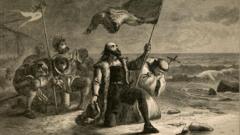Groundbreaking discoveries often come from unexpected places and times. In a recent twist to a historical mystery, years of genetic research challenge the accepted narrative around one of history's most famous explorers, Christopher Columbus. A recent study conducted by a team of Spanish scientists suggests the famed navigator was not Italian as traditionally believed but likely hailed from Spain, with Jewish lineage, specifically from the city of Valencia.
This revelation counters the once-presumed Genoese roots of Columbus and paints a picture of a man who possibly concealed his Jewish heritage or converted to Catholicism due to the rampant religious persecution of his time. The study’s findings emerge from a comprehensive DNA analysis that scrutinized what are thought to be Columbus's remains. These were originally exhumed from Seville Cathedral back in 2003 by a dedicated team led by forensic scientist José Antonio Lorente and historian Marcial Castro.
Through meticulous comparison of genetic samples from these remains and those of Columbus's son, Hernando, and brother, Diego, with DNA from descendants and historical eras, researchers embarked on a journey to unearth the elusive truth. For centuries, scholars and nations debated over Columbus's origins, with myriad theories suggesting he might be from Poland, Great Britain, Greece, Portugal, Hungary, or Scandinavia. However, the latest findings lend credence to the hypothesis of Columbus spending his formative years in Spain, incognito as a Jew due to religious constraints of the era, when Jews and Muslims were forced to convert to Catholicism or leave Spain around the time Columbus discovered the New World.
The study, publicized through a TV documentary titled "Columbus DNA: His True Origin" on Spain’s national broadcaster RTVE, coincided aptly with Spain’s National Day—a day commemorating Columbus's historic landing in the Americas, which marked the onset of European exploration in the region. The researchers assert that the study’s results are “almost absolutely reliable,” providing weight to the claim of Columbus's Spanish and Jewish identity, a revelation sure to stir intrigue and debate across historical and scientific communities.
This revelation counters the once-presumed Genoese roots of Columbus and paints a picture of a man who possibly concealed his Jewish heritage or converted to Catholicism due to the rampant religious persecution of his time. The study’s findings emerge from a comprehensive DNA analysis that scrutinized what are thought to be Columbus's remains. These were originally exhumed from Seville Cathedral back in 2003 by a dedicated team led by forensic scientist José Antonio Lorente and historian Marcial Castro.
Through meticulous comparison of genetic samples from these remains and those of Columbus's son, Hernando, and brother, Diego, with DNA from descendants and historical eras, researchers embarked on a journey to unearth the elusive truth. For centuries, scholars and nations debated over Columbus's origins, with myriad theories suggesting he might be from Poland, Great Britain, Greece, Portugal, Hungary, or Scandinavia. However, the latest findings lend credence to the hypothesis of Columbus spending his formative years in Spain, incognito as a Jew due to religious constraints of the era, when Jews and Muslims were forced to convert to Catholicism or leave Spain around the time Columbus discovered the New World.
The study, publicized through a TV documentary titled "Columbus DNA: His True Origin" on Spain’s national broadcaster RTVE, coincided aptly with Spain’s National Day—a day commemorating Columbus's historic landing in the Americas, which marked the onset of European exploration in the region. The researchers assert that the study’s results are “almost absolutely reliable,” providing weight to the claim of Columbus's Spanish and Jewish identity, a revelation sure to stir intrigue and debate across historical and scientific communities.






















